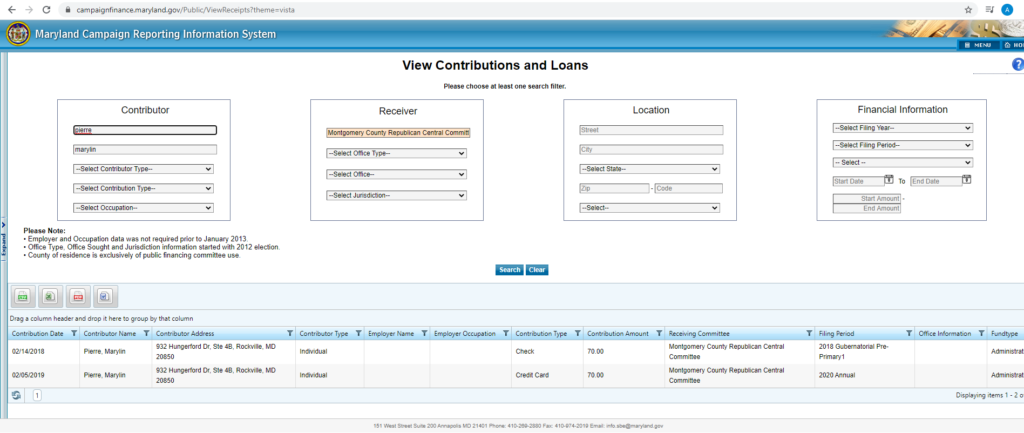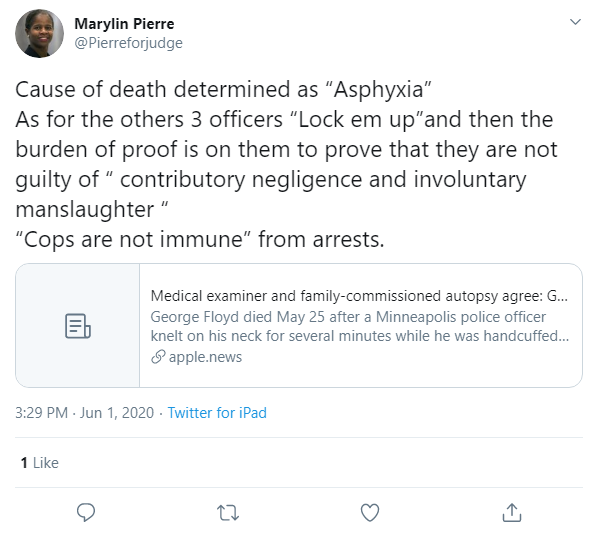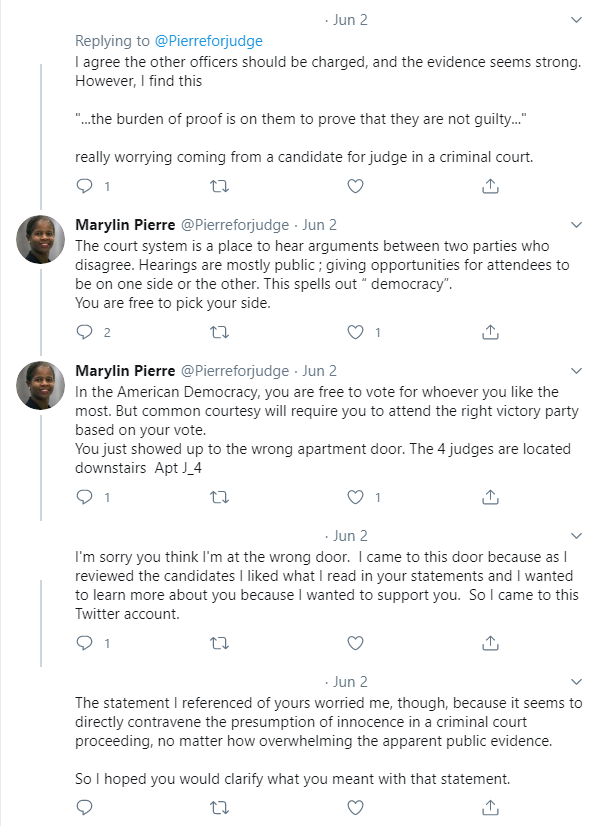By Adam Pagnucco.
Marylin Pierre, whose insurgent campaign for circuit court judge is backed by some progressive groups, has courted the county Republican Party for support. At least that’s what the former chairman of the MoCo GOP is claiming. And he has a picture and campaign finance records to prove it.
Maryland judicial elections are strange birds. In most elections, candidates run in partisan primaries to get their party nominations. The party nominees then face off against each other along with any write-in or unaffiliated petition candidates in a general election. In elections for circuit court or orphan’s court judges, candidates may run in any party primaries, including more than one party at a time, and whoever wins those primaries appears on the ballot in a non-partisan general election. For the most part, judicial candidates are those who emerge from a rigorous vetting process by judicial nominating commissions and receive temporary appointments to the bench pending election. However, other candidates who are age 30 or older, have been a state resident for 5 years and are a member of the Maryland bar may also run for judge.
Pierre has tried but failed to make it through the state’s vetting process before. Nevertheless, she has run for circuit court judge as is her right under state law. This year, four seats are on the ballot, each occupied by a vetted appointee (a sitting judge) seeking election. In the Republican primary, all four slots were won by the four sitting judges. In the Democratic primary, Pierre won one of the slots with three of the four sitting judges taking the others. Pierre is now facing the four sitting judges in a contentious general election. The top four vote-getters will win.
This is not the first time Pierre has run for judge. She ran in both the Democratic and Republican primaries in 2018 too, losing both and failing to advance to the general election. In evaluating Pierre’s current campaign, former MoCo GOP chairman and current central committee member Alexander A. Bush wrote an article on the party’s website recalling Pierre’s 2018 campaign. Bush wrote:
For a judicial candidate to get their name on the November General Election ballot, they must win in either the Republican or Democratic Primary election. Historically, insurgent candidates have focused on trying to win in the Republican Primary, because our primary has only about 15% as many voters as the Democratic Primary. It’s simple math: the campaigning necessary to win among 12,000 Republicans is a lot easier than the campaigning necessary to convince 75,000 Democrats.
And in 2018, that is exactly what Marylin Pierre attempted to do.
In January that year, Mrs. Pierre and her treasurer came to our candidate training event and assured those running the event that she would be a strongly conservative judge and asked for the party’s support in the 2018 Primary. Mrs. Pierre came to one of our fundraising dinners in early February to ask for our votes again, as campaign finance records will show. And later that month she came to our yearly convention, and proudly posed for a photo with the current county chairwoman for the Trump for President Campaign.
Bush ran this photo as proof.

State Board of Elections records also support Bush’s account, showing Pierre making two $70 contributions to the county Republican Party. One of those contributions (on 2/14/18) was made during the 2018 cycle. The other (on 2/5/19) was made after the 2018 election and occurred during this cycle.

Bush’s reaction to all this is scathing. He wrote:
Mrs. Pierre lost in both parties’ primaries in 2018. In fact, she did worse in the Republican Primary. Obviously, she has decided to change her strategy, and has remade herself into whatever she thinks will help her win.
If this doesn’t convince you, regardless of your political views, not to vote for Marylin Pierre, then nothing will.
After writing his article, Bush later told me directly, “At the candidate training, she asked for MCGOP’s support, claiming she would be a ‘law and order’ judge who would be tough on bail.”
This time around, Pierre is running as anything but a Republican. She has participated in Progressive Maryland’s candidate training program and has been endorsed by Progressive Neighbors, Our Revolution and Town of Somerset Mayor Jeffrey Slavin, one of the most progressive elected officials on Planet Earth. What would they have thought if they knew that she had been courting and donating to Republicans?

There is more. In a video on Facebook, Pierre criticized her opponents because a Trump supporter sat on one of their nominating commissions. Showing the person at a pro-Trump rally, Pierre said, “This woman was on the commission that recommended almost half of the Montgomery County judges to the governor. Does she share your values? Will the judges she recommended take Montgomery County in the direction you want to go?”

And so Pierre goes after her opponents because a Trump supporter sat on one of their nominating commissions after she herself gave money to the county GOP – twice.
I have asked Pierre for comment on Bush’s story and I will print it when I receive it.


